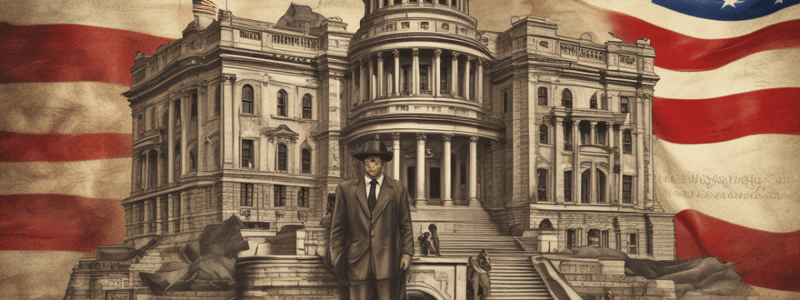Podcast
Questions and Answers
What is the primary focus of the Constitutional Law course in the Basic Recruit program?
What is the primary focus of the Constitutional Law course in the Basic Recruit program?
- Criminal Justice system
- Law enforcement instruction
- Basic concepts of Constitutional Law (correct)
- Peace officer liability
Which Amendments will be studied in depth in this course?
Which Amendments will be studied in depth in this course?
- Eleventh, Twelfth, Thirteenth, and Fourteenth Amendments
- First, Fourth, Fifth, Sixth, and Fourteenth Amendments (correct)
- First, Second, Third, and Fourth Amendments
- Seventh, Eighth, Ninth, and Tenth Amendments
What is the significance of the Fourteenth Amendment in relation to law enforcement?
What is the significance of the Fourteenth Amendment in relation to law enforcement?
- It only applies to Federal law enforcement
- It grants law enforcement officers more power
- It makes Federal guidelines apply to local law enforcement (correct)
- It limits the power of law enforcement officers
What is the primary reason for studying Constitutional Law in the Basic Recruit program?
What is the primary reason for studying Constitutional Law in the Basic Recruit program?
What is the importance of knowing Constitutional Law for law enforcement officers?
What is the importance of knowing Constitutional Law for law enforcement officers?
What topic will be explored in relation to the Fifth Amendment?
What topic will be explored in relation to the Fifth Amendment?
What will be explored in relation to the Fourth Amendment?
What will be explored in relation to the Fourth Amendment?
What is the final topic that will be explored in this course?
What is the final topic that will be explored in this course?
What is the main objective of the lesson plan?
What is the main objective of the lesson plan?
What is the purpose of the Bill of Rights?
What is the purpose of the Bill of Rights?
What is the relationship between the laws of the Federal and State governments established by the 14th Amendment?
What is the relationship between the laws of the Federal and State governments established by the 14th Amendment?
What is the role of the Exclusionary Rule in protecting Constitutional Rights?
What is the role of the Exclusionary Rule in protecting Constitutional Rights?
What is the purpose of the introductory activity in the lesson plan?
What is the purpose of the introductory activity in the lesson plan?
What is the primary method of instruction used in the lesson plan?
What is the primary method of instruction used in the lesson plan?
What is the purpose of the mid-term evaluation?
What is the purpose of the mid-term evaluation?
What is the main difference between civil and criminal law?
What is the main difference between civil and criminal law?
What is the purpose of distributing handouts on Constitutional Law and Study Aids?
What is the purpose of distributing handouts on Constitutional Law and Study Aids?
What is the purpose of role-playing in the lesson plan?
What is the purpose of role-playing in the lesson plan?
What is the purpose of the Bill of Rights?
What is the purpose of the Bill of Rights?
Which of the following is an exception to free speech protected by the First Amendment?
Which of the following is an exception to free speech protected by the First Amendment?
What is the term for words that are likely to provoke a breach of the peace?
What is the term for words that are likely to provoke a breach of the peace?
What is the category of speech that encompasses the regulation of false advertising and defamation of character?
What is the category of speech that encompasses the regulation of false advertising and defamation of character?
What is the term for written defamation?
What is the term for written defamation?
What is the term for speech that endangers national security or advocates illegal conduct?
What is the term for speech that endangers national security or advocates illegal conduct?
What is the condition for speech to lose its protection based on its advocacy of unlawful conduct?
What is the condition for speech to lose its protection based on its advocacy of unlawful conduct?
How many amendments are considered part of the Bill of Rights?
How many amendments are considered part of the Bill of Rights?
What is the purpose of the three-part test for identifying material that is obscene?
What is the purpose of the three-part test for identifying material that is obscene?
What is the term for speech that is likely to provoke a breach of the peace in a crowded theater where there is no fire?
What is the term for speech that is likely to provoke a breach of the peace in a crowded theater where there is no fire?
What is the basis upon which the government may regulate speech?
What is the basis upon which the government may regulate speech?
What was upheld by the Supreme Court in Kovacs v. Cooper (1949) and Ward v. Rock Against Racism (1989)?
What was upheld by the Supreme Court in Kovacs v. Cooper (1949) and Ward v. Rock Against Racism (1989)?
Which of the following speech is particularly well protected?
Which of the following speech is particularly well protected?
What is the probable best course of action for an officer to take when faced with speech that does not threaten them or interfere with their duties?
What is the probable best course of action for an officer to take when faced with speech that does not threaten them or interfere with their duties?
What is the purpose of the Fourteenth Amendment?
What is the purpose of the Fourteenth Amendment?
What is the significance of the Fourteenth Amendment for local law enforcement officers?
What is the significance of the Fourteenth Amendment for local law enforcement officers?
What is the role of the Executive Branch in relation to law enforcement?
What is the role of the Executive Branch in relation to law enforcement?
What is the role of the Judicial Branch in relation to law enforcement?
What is the role of the Judicial Branch in relation to law enforcement?
What is the source of frustration for conscientious police officers?
What is the source of frustration for conscientious police officers?
What is the concept that states that for every wrong, there is a remedy?
What is the concept that states that for every wrong, there is a remedy?
What is the concept that emphasizes the importance of having a remedy for a right?
What is the concept that emphasizes the importance of having a remedy for a right?
What is the purpose of the Exclusionary Rule?
What is the purpose of the Exclusionary Rule?
What is the main idea behind the concept of Right and Remedy?
What is the main idea behind the concept of Right and Remedy?
Which Amendment guarantees the right to a speedy and public trial by an impartial jury?
Which Amendment guarantees the right to a speedy and public trial by an impartial jury?
What is the significance of the Fourteenth Amendment's Section I?
What is the significance of the Fourteenth Amendment's Section I?
What is the purpose of the Bill of Rights?
What is the purpose of the Bill of Rights?
What is the main distinction between the Right and Remedy concept and the Common Law heritage?
What is the main distinction between the Right and Remedy concept and the Common Law heritage?
What is the relationship between the Exclusionary Rule and the Fourth Amendment?
What is the relationship between the Exclusionary Rule and the Fourth Amendment?
What is the significance of the Ninth Amendment?
What is the significance of the Ninth Amendment?
Which Amendment guarantees the right to a trial by jury in certain cases?
Which Amendment guarantees the right to a trial by jury in certain cases?
Flashcards are hidden until you start studying
Study Notes
Introduction to Constitutional Law
- The study of Constitutional Law is essential for law enforcement officers to understand their powers and limitations.
- The Constitution grants immense powers to law enforcement, but they are not limitless.
- A peace officer must know what they are empowered to do and what they are not allowed to do.
Objectives
- Identify the differences between civil and criminal law.
- Understand the Bill of Rights and its application to peace officers.
- Identify the effect of the 14th Amendment on local law enforcement.
- Understand the organization of the Federal and State governments.
- Understand the concept of "right and remedy".
Civil and Criminal Law
- Criminal Law: State vs. person, crime, proof beyond reasonable doubt, penalties ($, prison, death)
- Civil Law: Person vs. person, tort, preponderance of evidence, penalties ($)
The Bill of Rights
- The first 10 amendments to the US Constitution are considered the Bill of Rights.
- The Bill of Rights defines the rights guaranteed to all US citizens.
- It spells out certain things the federal government cannot do.
Amendments Relevant to Law Enforcement
- Amendment I: Free Speech, protects citizens' right to express their views.
- Amendment IV: Unreasonable searches and seizures, requires probable cause.
- Amendment V: Freedom from self-incrimination, speed trial, and assistance of counsel.
- Amendment VI: Speedy trial, confrontation with witnesses, and assistance of counsel.
The 14th Amendment
- Established the primacy of the Federal government over state governments.
- Guaranteed the same basic rights to all citizens, regardless of the state in which they reside.
- Made the Bill of Rights, especially the 4th, 5th, and 6th Amendments, apply to local law enforcement.
Federal and State Governments
- Divided into three branches: Legislative, Executive, and Judicial.
- The local police officer is part of the Executive Branch of the State.
- The work produced by the police officer is used by the Judicial Branch.
Right and Remedy
- A Common Law concept that states the theory behind the Exclusionary Rule.
- Means that in order for a right to have any meaning, there must be a remedy.
- The Exclusionary Rule is the remedy for some of the rights guaranteed by the Bill of Rights.
Studying That Suits You
Use AI to generate personalized quizzes and flashcards to suit your learning preferences.





